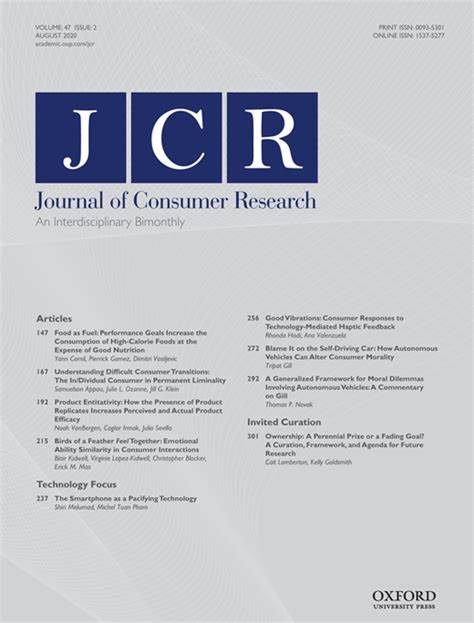Undermining Desire: Reducing Unhealthy Choices by Highlighting Short-Term (vs. Long-Term) Costs
IF 6.4
1区 管理学
Q1 BUSINESS
引用次数: 2
Abstract
What motivates consumers to avoid unhealthy behaviors (e.g., consuming sugar, energy drinks, and fast food)? Traditional interventions and lay intuition suggest that to motivate themselves, consumers can consider the negative long-term health consequences of their decisions. Yet, consumers still struggle to avoid unhealthy behaviors. Seven experiments (N = 4,021) offer a different approach. We find that considering short-term costs of unhealthy behaviors (e.g., irritability or indigestion after eating sugar) better curbs these behaviors than considering long-term costs or no costs. We theorize that short-term costs are more effective at reducing unhealthy behavior because they are more strongly associated with the act of consumption, both in terms of immediate timing and perceived likelihood of costs occurring. As such, short-term costs are better at undermining the reason for consuming unhealthily: anticipated enjoyment of the consumption experience. We test this process by (1) demonstrating mediation via increased association strength and subsequent decreased anticipated enjoyment, (2) manipulating the association strength between consumption and costs (i.e., same cost realized sooner vs. later), and (3) demonstrating moderation via consumers’ goal for eating unhealthily. These results identify a powerful, but underutilized self-regulation strategy—emphasizing short-term costs of unhealthy consumption—with implications for consumers and marketers.削弱欲望:通过强调短期(相对于长期)成本来减少不健康的选择
是什么促使消费者避免不健康行为(例如,摄入糖、能量饮料和快餐)?传统的干预措施和外行的直觉表明,为了激励自己,消费者可以考虑他们的决定对健康的长期负面影响。然而,消费者仍在努力避免不健康的行为。七个实验(N = 4021)提供了不同的方法。我们发现,考虑不健康行为的短期成本(例如,吃糖后的易怒或消化不良)比考虑长期成本或无成本更好地控制这些行为。我们的理论是,短期成本在减少不健康行为方面更有效,因为它们与消费行为的相关性更强,无论是在即时时间还是在感知成本发生的可能性方面。因此,短期成本更能破坏不健康消费的原因:对消费体验的预期享受。我们通过(1)通过增加关联强度和随后降低的预期享受来证明中介作用,(2)操纵消费和成本之间的关联强度(即,相同的成本迟早实现),以及(3)通过消费者的饮食不健康目标来证明适度。这些结果确定了一种强大但未被充分利用的自我调节策略——强调不健康消费的短期成本——对消费者和营销人员都有影响。
本文章由计算机程序翻译,如有差异,请以英文原文为准。
求助全文
约1分钟内获得全文
求助全文
来源期刊

Journal of Consumer Research
BUSINESS-
CiteScore
12.00
自引率
9.70%
发文量
53
期刊介绍:
Journal of Consumer Research, established in 1974, is a reputable journal that publishes high-quality empirical, theoretical, and methodological papers on a wide range of consumer research topics. The primary objective of JCR is to contribute to the advancement of understanding consumer behavior and the practice of consumer research.
To be considered for publication in JCR, a paper must make a significant contribution to the existing body of knowledge in consumer research. It should aim to build upon, deepen, or challenge previous studies in the field of consumption, while providing both conceptual and empirical evidence to support its findings.
JCR prioritizes multidisciplinary perspectives, encouraging contributions from various disciplines, methodological approaches, theoretical frameworks, and substantive problem areas. The journal aims to cater to a diverse readership base by welcoming articles derived from different orientations and paradigms.
Overall, JCR is a valuable platform for scholars and researchers to share their work and contribute to the advancement of consumer research.
 求助内容:
求助内容: 应助结果提醒方式:
应助结果提醒方式:


